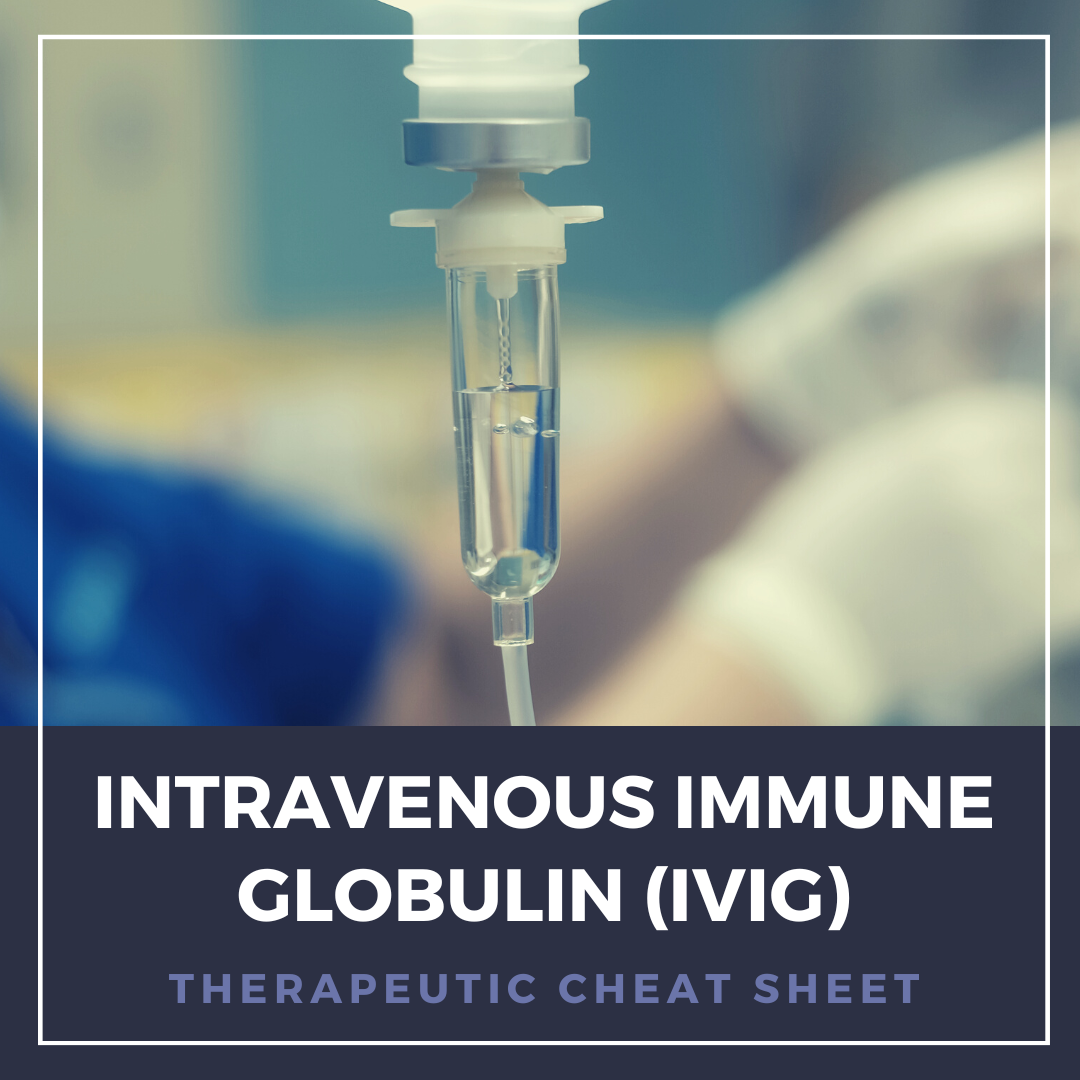Intravenous Immune Globulin (IVIG) Therapeutic Cheat Sheet
 Intravenous immune globulin (IVIG) is a concentrate of pooled immunoglobulins derived from plasma donors. Its unique mechanism of action expands the utility of the medication to a variety of conditions. We continue our series, Therapeutic Cheat Sheet, with a closer look at IVIG, which is FDA-approved for the treatment of dermatologic conditions including dermatomyositis, Kawasaki disease, ITP, and …
Intravenous immune globulin (IVIG) is a concentrate of pooled immunoglobulins derived from plasma donors. Its unique mechanism of action expands the utility of the medication to a variety of conditions. We continue our series, Therapeutic Cheat Sheet, with a closer look at IVIG, which is FDA-approved for the treatment of dermatologic conditions including dermatomyositis, Kawasaki disease, ITP, and …
 Intravenous immune globulin (IVIG) is a concentrate of pooled immunoglobulins derived from plasma donors. Its unique mechanism of action expands the utility of the medication to a variety of conditions. We continue our series, Therapeutic Cheat Sheet, with a closer look at IVIG, which is FDA-approved for the treatment of dermatologic conditions including dermatomyositis, Kawasaki disease, ITP, and …
Intravenous immune globulin (IVIG) is a concentrate of pooled immunoglobulins derived from plasma donors. Its unique mechanism of action expands the utility of the medication to a variety of conditions. We continue our series, Therapeutic Cheat Sheet, with a closer look at IVIG, which is FDA-approved for the treatment of dermatologic conditions including dermatomyositis, Kawasaki disease, ITP, and … Continue reading "Intravenous Immune Globulin (IVIG) Therapeutic Cheat Sheet"


 Next Steps in Derm, in partnership with ODAC Dermatology, Aesthetic & Surgical Conference, interviewed Dr. Arisa Ortiz, director of laser and cosmetic dermatology at UC San Diego Health. Dr. Ortiz shares why it’s important to set realistic expectations with patients who are seeking treatment for their acne scars. Watch as she outlines her approach for each type of scar, and shares a simple …
Next Steps in Derm, in partnership with ODAC Dermatology, Aesthetic & Surgical Conference, interviewed Dr. Arisa Ortiz, director of laser and cosmetic dermatology at UC San Diego Health. Dr. Ortiz shares why it’s important to set realistic expectations with patients who are seeking treatment for their acne scars. Watch as she outlines her approach for each type of scar, and shares a simple …  Next Steps in Derm, in partnership with ODAC Dermatology, Aesthetic & Surgical Conference, interviewed Dr. Omar Ibrahimi, a laser and cosmetic dermatologist, and Mohs surgeon in private practice in Stamford, Conn. Dr. Ibrahimi has about 40 different devices in his practice. Find out his favorites for treating lentigines, and how a patient’s assessment determines his choice of device. Watch …
Next Steps in Derm, in partnership with ODAC Dermatology, Aesthetic & Surgical Conference, interviewed Dr. Omar Ibrahimi, a laser and cosmetic dermatologist, and Mohs surgeon in private practice in Stamford, Conn. Dr. Ibrahimi has about 40 different devices in his practice. Find out his favorites for treating lentigines, and how a patient’s assessment determines his choice of device. Watch …  ABC News and other media outlets recently covered the story of the World's Smallest Skin Cancer – diagnosed by a team at Oregon Health & Science University and noted by Guinness World Records. How is technology changing melanoma detection? What’s the future?
For expert advice, I reached out to Mohs surgeon Anthony Rossi, MD, assistant attending dermatologist at Memorial Sloan Kettering …
ABC News and other media outlets recently covered the story of the World's Smallest Skin Cancer – diagnosed by a team at Oregon Health & Science University and noted by Guinness World Records. How is technology changing melanoma detection? What’s the future?
For expert advice, I reached out to Mohs surgeon Anthony Rossi, MD, assistant attending dermatologist at Memorial Sloan Kettering …  Next Steps in Derm, in partnership with ODAC Dermatology, Aesthetic & Surgical Conference, interviewed Dr. David Ozog, chair of the dermatology department at Henry Ford Hospital. Watch as Dr. Ozog outlines his approach to handling complications from dermatology procedures. He believes communication may very well be the most important consideration, so hear how he keeps in touch with his patie …
Next Steps in Derm, in partnership with ODAC Dermatology, Aesthetic & Surgical Conference, interviewed Dr. David Ozog, chair of the dermatology department at Henry Ford Hospital. Watch as Dr. Ozog outlines his approach to handling complications from dermatology procedures. He believes communication may very well be the most important consideration, so hear how he keeps in touch with his patie …